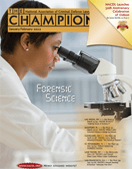January/February 2012

How does the defense team research the background of the prosecution's expert? What are effective strategies for challenging forensic evidence?
Articles in this Issue
-
A Path Forward: Where Are We Now?
While DNA evidence has benefitted from extensive scientific research, other forensic fields (such as hair and fiber analysis and ballistics) have not been subjected to extensive research and investigation. Jennifer Friedman writes that cases relying in whole or in part on forensic evidence must be carefully scrutinized. In addition to traditional investigation and obtaining expert assistance, criminal defense attorneys should consider challenging the admissibility of the evidence. Moreover, attorneys should seek to limit how the evidence is presented by the expert — consistent with existing research. Real reform must come from the courts, and effective representation by criminal defense lawyers will spark these reform efforts.
-
Book Review: International Human Rights and Mental Disability Law: When the Silenced are Heard
Quest for Justice Defending the Damned, By Michael L. Perlin, Oxford University Press (2011), Reviewed by Robert M. Sanger
-
Book Review: Murder in Muncy Creek
Quest for Justice Defending the Damned, By William Bailey and Peggy Bailey, Special Publications Inc. (2011), Reviewed by Maureen Rowland
-
Book Review: Quest for Justice - Defending the Damned
Quest for Justice Defending the Damned By Richard S. Jaffe, New Horizon Press (2012), Reviewed by William R. Montross Jr.
-
Cross-Examining The Expert Witness: Do’s and Don’ts and An Occasional Maybe
If defense attorneys train members of the defense team to conduct extensive research into an expert’s background, and if attorneys put effort into understanding the science involved in a case and the tests used to evaluate a client, they will be able to stand their ground and expose bad experts and false science. The client’s life may depend on it.
-
Defending Employers When ICE Puts the Heat On
The Department of Homeland Security, through its Immigration and Customs Enforcement (ICE) division, aggressively pursues employers suspected of hiring and harboring illegal aliens. Matthew Leitman and Paul Hudson discuss several defenses and arguments available to employers facing immigration-related charges. They recommend that employers challenge ICE’s deportation of exculpatory witnesses and seek a narrow construction of the alien harboring statute.
-
Defense Authorization Act Provides for Indefinite Military Detention (NACDL News)
Defense Authorization Act Provides for Indefinite Military Detention (NACDL News)
-
Florida Supreme Court Hears Argument on State’s Strict Liability Felony Drug Law (NACDL News)
Florida Supreme Court Hears Argument on State’s Strict Liability Felony Drug Law (NACDL News)
-
Ida B. Wells and the Sense of Justice (From the President)
I admire journalist Ida B. Wells because she was a fighter. The goal she fought for – fair trials – is what criminal defense lawyers fight for every day when standing alongside the accused.
-
Inside NACDL: After Half a Century, Gideon’s Promise Remains Elusive
When the Supreme Court decided Gideon v. Wainwright, for most persons accused of serious crimes the notion of fairness was redefined. No longer was the Sixth Amendment right to counsel available only for those with the means to afford it; it was there for everyone charged with a felony. Gideon, however, remains a promise unfulfilled because while the Court compelled the states to provide counsel, it did not prescribe nor describe a mechanism to pay for it.
-
Mueller Elected to NACDL Board Of Directors (NACDL News)
Mueller Elected to NACDL Board Of Directors (NACDL News)
-
NACDL to Honor 50th Anniversary of Gideon (NACDL News)
NACDL to Honor 50th Anniversary of Gideon (NACDL News)
-
NACDL’s Powerful Voice: Unified Advocacy (Grassroots Advocacy)
The importance of individual grassroots advocacy cannot be overstated, and NACDL makes engaging in advocacy as quick and as easy as possible. On average, engaging in a preplanned advocacy effort takes less than one minute.
-
Nevada Supreme Court Justice Cherry Receives NACDL Champion of Indigent Defense Award (NACDL News)
Nevada Supreme Court Justice Cherry Receives NACDL Champion of Indigent Defense Award (NACDL News)
-
Psych Testing 101: A Lawyer's Guide to Psychological Reports
The Department of Homeland Security, through its Immigration and Customs Enforcement (ICE) division, aggressively pursues employers suspected of hiring and harboring illegal aliens. Matthew Leitman and Paul Hudson discuss several defenses and arguments available to employers facing immigration-related charges. They recommend that employers challenge ICE’s deportation of exculpatory witnesses and seek a narrow construction of the alien harboring statute.
-
Retrograde Extrapolation: A Scientifically Flawed Procedure (DWI)
If a driver’s blood-alcohol concentration (BAC) is below the legal limit when the driver gives a breath or blood sample, this fact will not stop the prosecution from trying to obtain a DWI conviction. At trial, the state may attempt to use retrograde extrapolation to convince the jury that the BAC exceeded the legal limit earlier when the police stopped the driver on the highway. But retrograde extrapolation is an unreliable tool.
-
Stevens Prosecutors Won’t Face Charges (NACDL News)
Stevens Prosecutors Won’t Face Charges (NACDL News)
-
Strengthening Forensic Science in the United States: A Path Forward — Or Has It Been a Path Misplace
Crime laboratory scandals have arisen over and over again across the country. A 2009 report by the National Academy of Sciences discussed the flaws in the forensic science system and offered solutions. However, less progress has been made than the criminal defense bar would have hoped. The changes recommended by NAS to overhaul the current structure provide a road map for positive reform, but there has been pushback from prosecutors and the forensic science community. The report created a window of opportunity for criminal defense attorneys to demand meaningful reform. This momentum must not be lost, and defense attorneys must ensure that junk science is not grandfathered into the judicial system.
